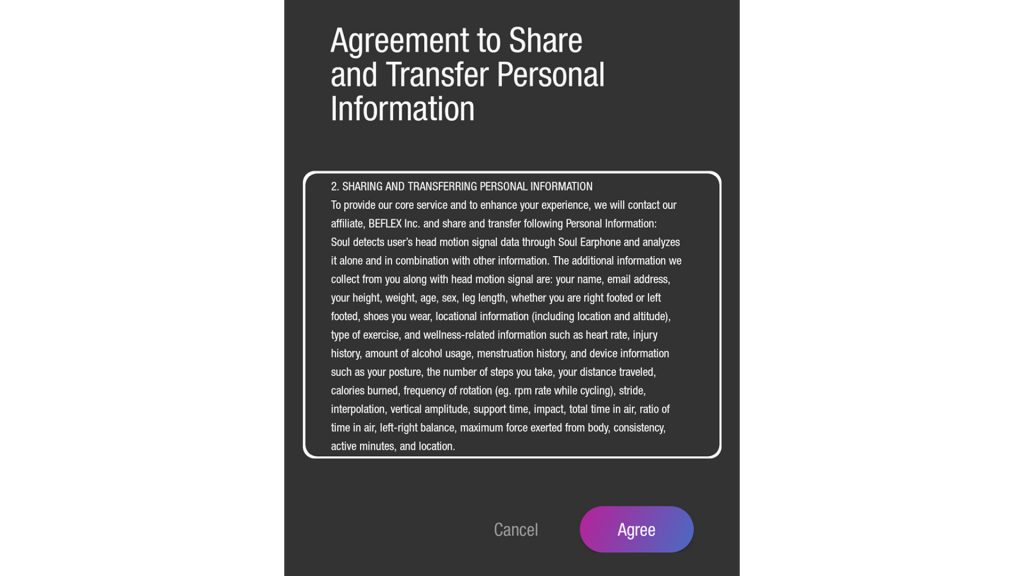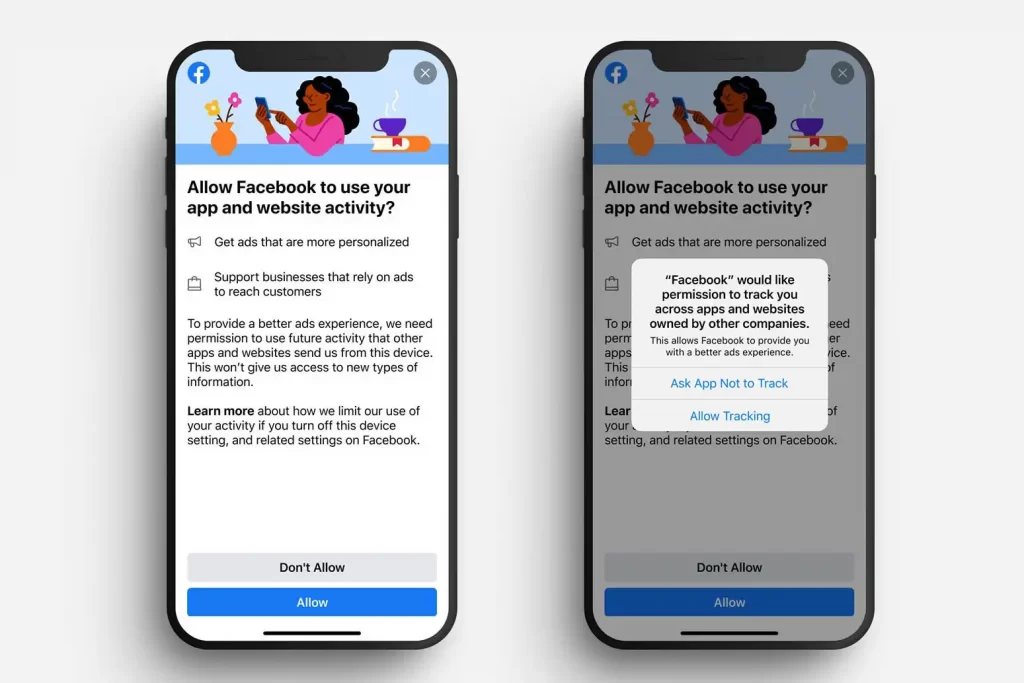Nowadays, you can hardly visit a website or open an app on your cell phone without encountering an ad sooner or later. But unlike the commercials on TV or the billboards in public places, the advertising in the browser is tailored to each user. The advantage for the companies is obvious: the better the ad fits the recipient, the higher the probability that the respective product will be purchased, or the offered service will be used. Through targeted advertising, companies increase their sales, but one must also ask what effects this has on the individual users and society. Even if it can be beneficial for all sides, we believe that targeted advertising does more harm than good.
Do we have a choice?
In order to be able to place targeted advertising, you need data about the people you want to reach. Thanks to data protection, we have the possibility to choose an option where non of our presonal data will be stored. But do we really? Services are often no longer usable if we don’t allow data about us to be stored, but there are other ways around data protection. Often so-called “dark patterns” are used to force a desired behaviour in a user by tricks in user interfaces that are used to make us do things we don’t mean to do. For example, when registering in LinkedIn, the user was asked eight times to agree to send an invitation for LinkedIn to all contacts of the given email. Fortunately, in this case, a lawsuit was filed and LinkedIn had to pay a fine of 13 million dollars. But usually such dark patterns remain without consequence.

So internet companies collect data about us, and we agree to it more or less voluntarily. This also has advantages for both sides, through the analysis of personal data can be placed more accurate advertisements, so you get advertising for products or services that you could use a young Real Madrid fan will then rather be offered jerseys and tickets from Real Madrid than an older art lover. Nevertheless, in our opinion, it becomes critical at the latest when companies buy the personal data and then use it to exploit the users. Not every user wants to have their data about illnesses or a purchase on a dubious website linked to their profile. Unfortunately, there is no single solution to this problem. However, there are more and more companies that are taking the right steps towards privacy. For example, Google allows users to edit the search history associated with their profile. Microsoft says that it does not link the behavior of its visitors to their usernames, even if those people are registered.
A recent study has shown that the public opposes advertising that is customized based on sensitive private information. One reason for this could be that customers seem to be creeped out by targeted advertising. According to a study conducted by CheetahDigital, around 54% of consumers find personalized advertising creepy. If this advertising then appears across all devices, 66% find it scary, and 72% find advertising alarming that uses location data. However, 50% said they feel personalized advertising helps them find products and services they find useful. Regardless of how useful good recommendations are, the creepiness factor outweighs the potential benefits.
Power of Advertising
Marketing is a vital asset to most companies, due to the vast number of competing companies, where new and clever strategies are developed constantly to gain a competitive advantage. Advertisers often argue that marketing helps the company not only to increase sales, but also to analyze and study the needs of their consumers. While this is true to some extent, many consumers feel that advertisements create needs that have not been there before, that encourages consumers into buying unnecessary products and services, forcing them into a spiral of debt or unmet desire.

Microtargeted advertising differs from other kinds of advertising in the way how it can effectively touch on primal instincts by serving the right ads at the right time and place. It can increase desire until it becomes indistinguishable from the real needs. Real needs are things such as food, clothing, physical comfort and safety, but due to clever marketing strategies many wants, such as the desire for a new phone or laptop, a larger home, new designer clothes or even the feeling of status after buying a new car can be converted to a perceived feeling of need.
Once you saw something, it can’t be unseen
When talking about marketing, companies emphasize the needs of consumers and how they are trying to do their best to fulfil them. But why would they want to fiercely compete with other companies for demand when it is easier to increase the demand by converting wants to perceived needs?
Conventional advertising is not as effective as targeted advertisements, which are tailored to many target groups, enabling them to find the most vulnerable people, whose wants can be converted to perceived needs with the least effort and highest success ratio. Targeted ads are effective because it allows marketers to choose the type of content that has the highest level of engagement. However, targeted also allow adjusting the frequency of ads shown to each user. If a user clicks on more ads, that increases the price of that user, which encourages platforms to show more ads to certain users. This is a positive feedback loop, the more ads a user clicks on, the more ads the user is likely to see. Once the user has seen the ad just right for them the battle is over, they can either spend money on an item that they previously thought they didn’t need or leave with a feeling of missing out on something great.
A study with more than 900,000 EU citizen participants found evidence of negative link between advertising and wellbeing. The study showed that doubling the advertising budget would result in a 3% drop in life satisfaction. Marriage has an absolute 6% influence and being unemployed has only a 12% impact, showing just how much advertising affects people’s life satisfaction.
How Social Media uses ads
David Heinemer Hansson, a young tech executive, was questioned by the Congress in the US, and he argued that “Banning targeted ads is the ultimate root-cause solution when it comes to privacy”. If companies couldn’t use personal data to target ads, they would have no reason to gather, buy or in some cases even steal that data in the first place because it would be worthless. Google and Facebook earn the majority of their revenue by selling ads, but not any kind of ads. They are in the business of behavioral advertising, that allow them to target people based on their current mood, sexual orientation and their recent online history. Advertisers can then bid for every single ad space for each user in an automated auction, taking place in just a few milliseconds. This incentivizes social media platforms to direct their users to inflammatory content, conspiracy theories and political disinformation, wherever the cost of ads are the highest.

Many experts blame the ad driven business model for the ever-increasing hateful and misinformation content. Jeff Gary and Ashkan Soltani argued that restricting or lessening the capabilities of microtargeted ads would be more effective and raise fewer free speech issues than any law regulating online communication. Social media platforms and advertisers work in cooperation to control users’ attention, the more time spent on social media the more accurate the targeted ads become and the more ads a user will be shown, in combination with the fact that users gravitate towards provocative content. This is a win-win situation for advertisers and online platforms, to the detriment of the users.
Protecting user privacy, controlling disinformation and hate speech seems like an impossible problem to solve, but what if all targeted advertisements were banned?
The change for users would be subtle, many would not even notice for a few hours or days. When you search for travel destinations on Google then you would see ads of travel agencies, airlines and hotels, then when you get hungry and want to order something for lunch you would see ads for restaurants and delivery services. Spotify could still recommend songs you might like, Netflix could suggest TV shows to you based on the movies you watched recently. The ads would be still relevant, but they couldn’t follow you for weeks, on all websites you visit. When you are thinking of ordering new shoes on Amazon, but you decide that you don’t need them, you wouldn’t see ads for Nike and Adidas for the next few weeks anywhere you go online. It is because companies could not sell the data they gathered from users to other platforms and data brokers.
Social media platforms would still have their massive user base, they could show the same ads to every user, and while people would be less inclined to click on the ad and buy the product, that would not mean that they have a worse experience. They would probably be able to read news that objectively reflect the current situation by presenting arguments from both sides. Although it would likely not solve all problems that news outlets face, they would help them by shifting the advertisers to contextual advertising, where ads are served based on the topic of the articles.
Some people defend the status quo, John Deighton, a business professor at Harvard, says that “Nobody likes advertising, they just like what they get for free as a result of it”. He says that any alternative would lead to less content and many subscription walls. Dave Grimaldi, an executive at the Interactive Advertising Bureau, says that “I think that relevant ads enhance the consumer experience” and has a positive opinion on targeted advertising: “I think they help serve the right ads to the right people at the right time.” However, most surveys end up with a very different conclusion.
96% opts out
User preference is hard to test because very few people even understand that this is a tradeoff. Apple created a new feature that allows users to opt out of activity tracking across multiple application and 96% of people turned that feature on, showing that the vast majority of users choose privacy when they’re presented with a clear choice between privacy and more relevant ads.

Google and other platforms argue that microtargeting helps publishers and small businesses to survive. Mark Zuckerberg says Facebook is “standing up for giving small businesses more opportunity and sophisticated tools against those who say targeted advertising is a problem.” Small businesses, especially direct-to-consumer are shown to use behavioral ads more effectively than their competition, however, the low number and share of startups in the US and Europe does not seem to support this theory. Looking at the financial reports of Facebook and Google shows a much different picture, Google’s revenue increased by 500% in the last 10 years while Facebook managed to increase revenue by an incredible 3100%.
There is hope
In Europe, a coalition of activists say that the current model of behavioral advertising is already illegal in the EU thanks to the GDPR law and filed legal complaints in around the EU. The real-time bidding system that allows advertisers to compete for ad spaces for each user. The GDPR forbids companies from processing data without the user’s consent, and it is impossible for users to consent to real-time bidding when they don’t even know which companies are involved in the auction. There is a loophole, however, companies can gather and process user data if it is necessary for their legitimate interests, and they comply with the fundamental rights and freedoms of the users. This case is still to be decided by courts, but this coalition of activists hopes that if they manage to ban this advertising model in the EU, the rest of the world will follow.
While banning microtargeting is unlikely to cure all problems of the internet, but it would be the first step in the right direction. Some businesses would struggle to adapt, but most companies currently involved in online marketing would find a way to adapt. Google currently makes about 60% of its revenue from serving ads based on people’s search terms, and Facebook could leverage their massive user base. Users would still likely to see relevant ads, just not ones specific to them personally, and would not have to worry about their privacy. That could be the start to getting the internet and tech companies under control.

